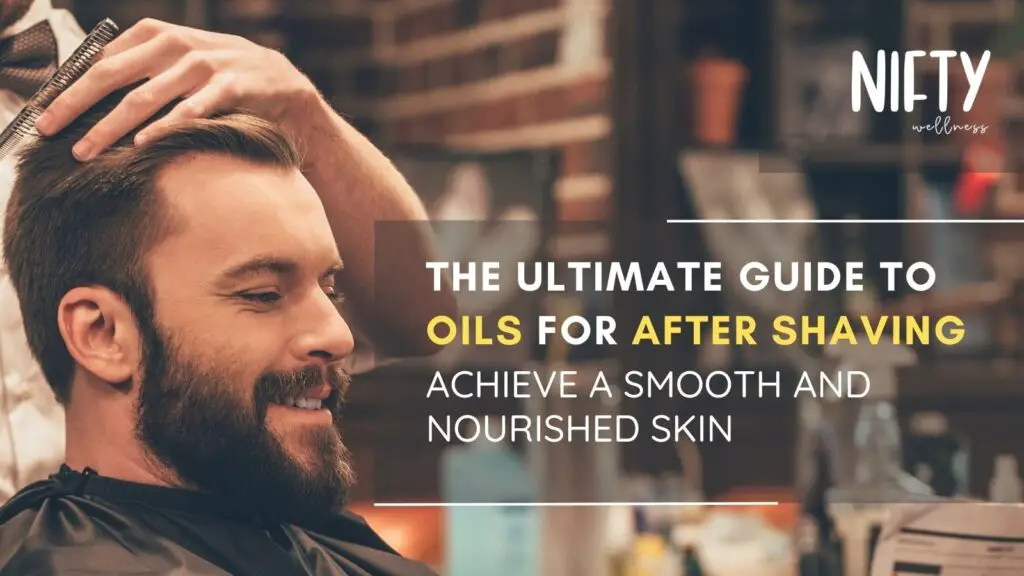Ever found yourself wincing at the sting of your aftershave? Wondered how to soothe that irksome razor burn? Or asked yourself how to achieve that enviable skin smoothness post-shave?
You’re not alone, and we’re here to help.
Every shaving routine needs post-shave care, a crucial step for healthy, nourished, and irresistibly smooth skin. After shaving, your skin is vulnerable, so it’s the perfect time to give it some extra attention. That’s where post-shave oils come in, turning your routine into a spa-like treat at home.
This ultimate guide will navigate you through the world of essential oils, spotlighting the best essential oil for burns, those essential oils for stopping bleeding, and everyday staples like coconut oil for razor bumps or tea tree oil for after-shave care. So get ready as we delve into the fascinating world of after-shave oils – your passport to the ideally smooth skin you’ve always dreamed of.
Understanding the Benefits of Oils for After Shaving
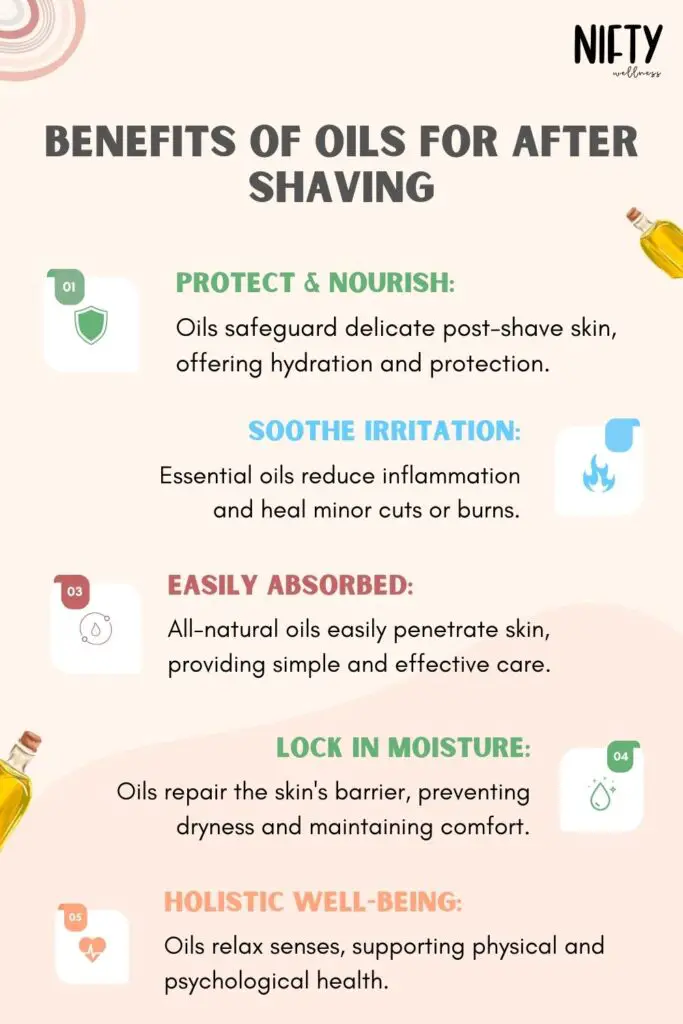
A successful post-shave routine hinges on understanding the benefits of oils. After shaving, your skin is vulnerable and exposed, increasing the risk of cuts and infection. Oils for after shaving protect and nourish your delicate skin, guarding against damage and bacteria while offering additional nourishing benefits.
Why are Oils Essential for Post-Shave Care?
The answer to this question lies in the way our skin works. During shaving, the razor strips away protective oils and dead skin cells, leaving your skin vulnerable. To repair its barrier function and prevent moisture loss, you need restorative post-shave care to replenish your skin’s natural lipid levels. The right oils for after shaving can be your skin’s best friend, offering protection, hydration, and soothing benefits.
How Oils Help Soothe and Nourish the Skin
Oils are like secret agents of skincare – they penetrate deep into the skin layers, carrying essential nutrients and antioxidants that repair, rejuvenate, and hydrate the skin. When it comes to after-shaving, oils are nothing less than superheroes. They soothe the skin, reducing irritation and inflammation associated with shaving. Additionally, their antiseptic properties help heal minor cuts or burns.
Unlike synthetic alternatives, essential oils have a far-reaching impact, relaxing our senses and supporting our physical and psychological well-being. Their all-natural composition allows them to be easily absorbed through the skin, making them highly receptive to simple topical remedies and applications.
It’s no wonder that essential oils have gained popularity not only among herbalists, aromatherapists, and natural brands but also in mainstream cosmetic companies. From premium perfumes to basic soaps, essential oils have found their way into a wide range of products.
Furthermore, oils help in repairing the skin’s natural barrier, thus locking in the moisture and preventing dryness. The result? A comfortable, smooth, and happy skin post-shave – every time. No wonder that oils for after shaving are increasingly favoured in skincare routines worldwide. So next time you shave, remember to reach for that bottle of oil – your skin will thank you!
Exploring Essential Oils for Razor Burn Relief
What is Razor Burn and Why It Occurs
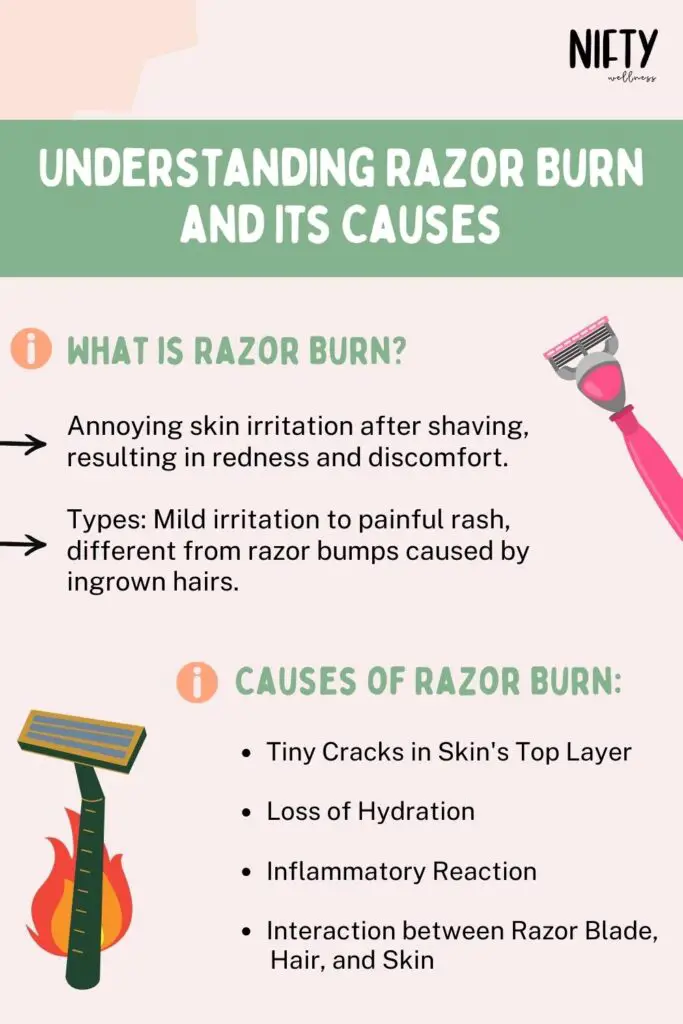
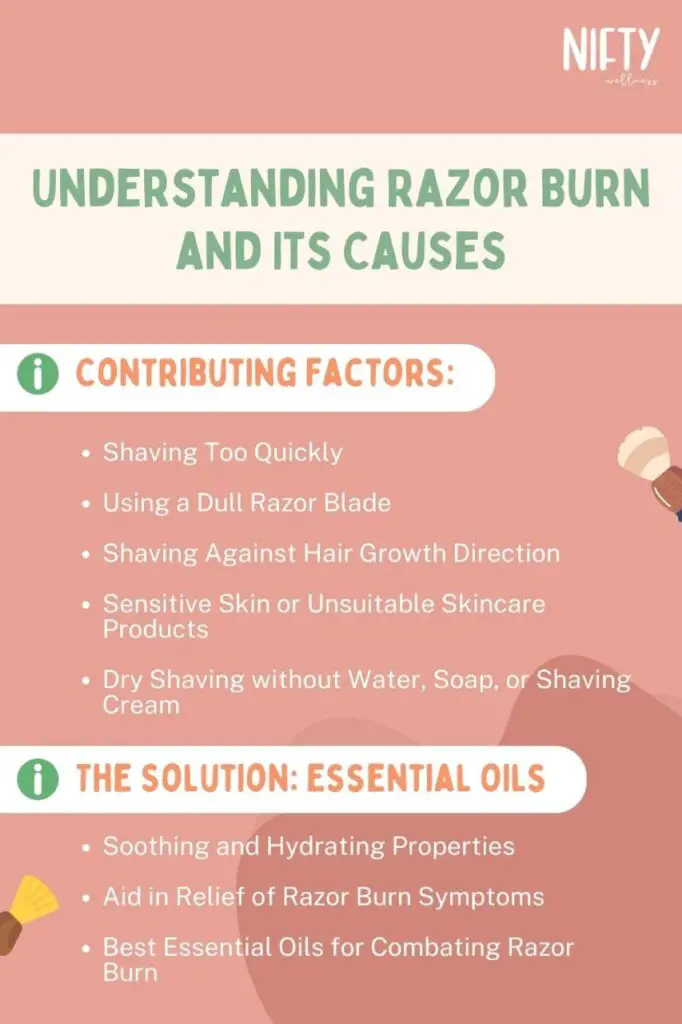
You’ve just finished shaving and suddenly, you feel an itch growing, followed by a painful burning sensation. You look in the mirror and see the dreaded redness spreading. You’ve got razor burn.
So, what is razor burn and why does it occur?
Razor burn is something we all come across at some point. It’s that annoying skin irritation that can happen after shaving and show up in various forms. Some are just mild, while others can be a painful rash. It’s not the same as razor bumps, which are caused by those pesky ingrown hairs.
The occurrence of razor burn is rooted in the interaction between your razor blade, your hair, and your skin. Imagine this – as the blade moves across your skin, it can cause tiny cracks in its top layer, leading to a loss of hydration and an inflammatory reaction. This situation can be exacerbated by dry shaving (shaving without any water, soap, or shaving cream), shaving too quickly, using a dull razor blade, or going against the direction of hair growth. If you have sensitive skin, or if you’re using products that don’t agree with your skin, you’re more likely to experience this discomfort.
The good news? Essential oils can be a saving grace. Certain essential oils for burns are known for their soothing and hydrating properties, and can greatly aid in the relief of razor burn symptoms. Stay with us as we delve into the world of essential oils, and explore the best ones for combating razor burn.
Top Essential Oils for Treating Razor Burn
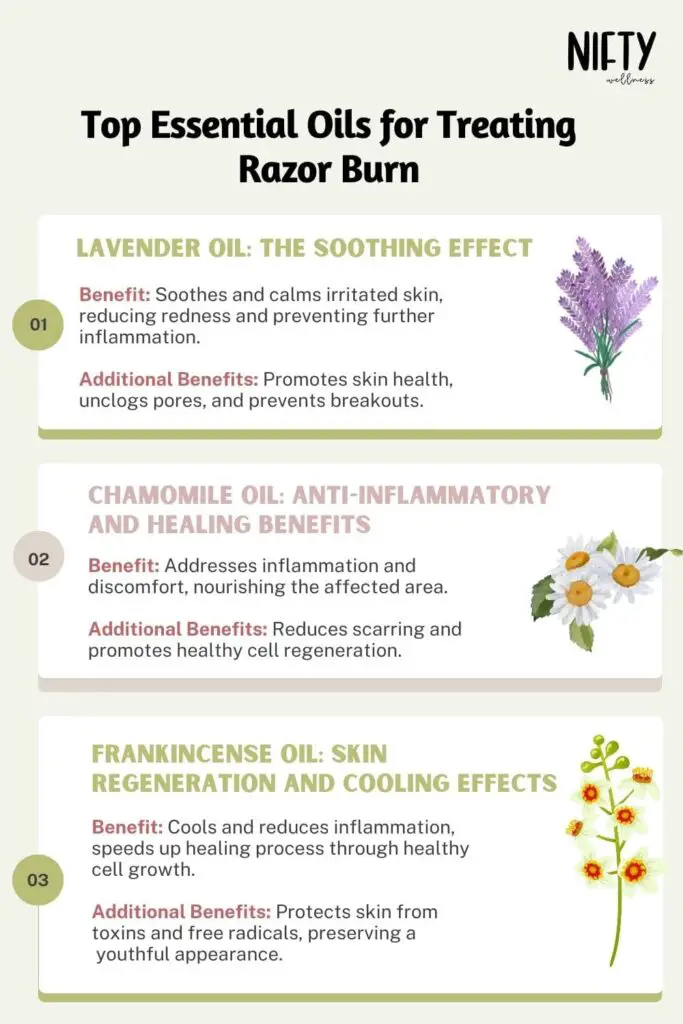
Treating Razor Burn with Lavender Oil: The Soothing Effect
One of the coolest things about Lavender oil is how it can effectively treat razor burn, which is such a pain for folks who shave regularly. It’s all thanks to its soothing and calming properties that work like magic on irritated skin. Razor burn can be a real bother, causing redness, itchiness, and those pesky little bumps.
But fear not! Lavender oil, with its anti-inflammatory powers, can help calm down all that irritation from razor burn. Just a few drops of this amazing essential oil can bring relief to the pain and discomfort. Plus, it even helps reduce redness and prevent further inflammation.
Moreover, Lavender oil promotes skin health by unclogging pores and preventing breakouts. It also boasts antiseptic properties that can help keep the shaved area free from infections, accelerating the healing process, and ensuring smoother and healthier skin.
Therefore, not only does Lavender oil soothe and calm the skin after a shave, but it also promotes overall skin health, making it an ideal choice for those looking into oils for after shaving.
Here are some famous Lavender Essential Oil products which we’d recommend for you.
Chamomile Oil: Anti-inflammatory and Healing Benefits
Chamomile oil is well known for its anti-inflammatory and healing properties, making it an ideal choice for treating razor burns. As with Lavender oil, Chamomile oil can be very helpful in addressing the inflammation and discomfort associated with razor burns. It also helps reduce redness while promoting skin health by providing nourishment to the affected area.
Chamomile oil can be used topically, diluted with a carrier oil like coconut or olive oil. Simply apply the mixture to the affected area and leave it for a few minutes before rinsing off. For added relief from razor burn, you may choose to also use Chamomile extract in your skincare routine – this can help moisturize and soothe the skin, making it less prone to irritation.
Moreover, Chamomile oil can help reduce scarring from razor burns by promoting healthy cell regeneration. For best results when using Chamomile oil for this purpose, make sure to use a product that is high quality and organic.
Here are some famous Chamomile Essential Oil products that we’d recommend for you.
Frankincense Oil: Skin Regeneration and Cooling Effects
Frankincense oil is a powerful essential oil that has been used for centuries to soothe and heal the skin. It is known for its cooling effects, which can help reduce inflammation and discomfort associated with razor burns. Additionally, Frankincense oil promotes healthy cell growth and regeneration in the affected area, helping speed up the healing process. It also helps protect your skin from environmental toxins and free radicals, helping to preserve its youthful appearance.
For best results, dilute Frankincense oil with a carrier oil before applying it to the affected area. It should be left on for at least 10 minutes before rinsing off. As a choice, you may opt to use a high quality moisturizer in place of a carrier oil – this can help lock in the healing benefits of Frankincense oil, while also providing additional nourishment to the skin.
In essence, incorporating this powerful essential oil into your post-shave routine can significantly contribute to maintaining a healthy, nourished, and youthful-looking skin. Remember to use a high-quality product and appropriately dilute it with a carrier oil or moisturizer for optimal benefits.
Here are some famous Frankincense Essential Oil products that we’d recommend for you.
Bid bunions farewell with “7 Helpful Essential Oils For Bunions & How To Use Them” – your guide to pain relief and comfort!
Essential Oils for Stopping Bleeding After Shaving
Why Bleeding Occurs after Shaving?
When we shave, often we experience skin irritation and even bleeding. This is caused by the sharp blades of our razors removing more than just the hair – it also removes the top layer of dead skin cells. Without proper care, this damage can become infected or lead to scarring.
Therefore, it is important to take measures to repair and replenish the skin after shaving. Fortunately, there are a number of essential oils that can help with this process!
Effective Essential Oils For Stopping Bleeding After Shaving
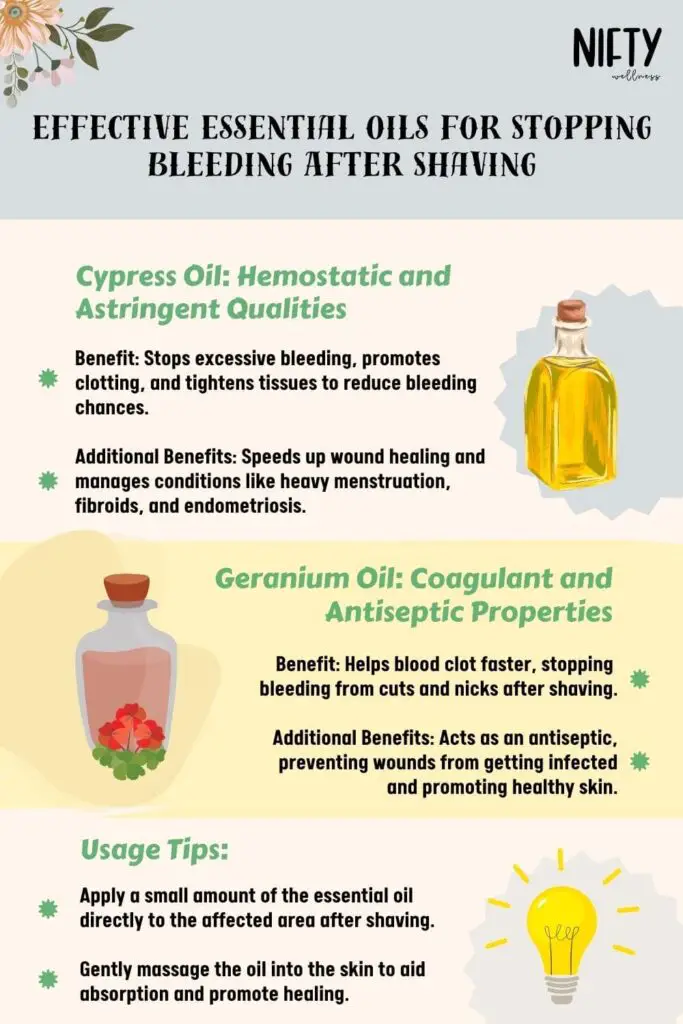
Let’s take a deep dive into some essential oils known for their healing properties that can aid in stopping bleeding after shaving, ensuring your skin remains smooth and healthy.
Cypress Oil: Hemostatic and Astringent Qualities
Cypress oil is an amazing remedy for controlling bleeding after shaving. It has these unique properties that help stop excessive blood flow and promote clotting, so it’s super useful for treating nicks or cuts. And get this, it also tightens tissues like hair follicles, muscles, and gums, which strengthens the follicles and reduces the chance of bleeding.
But wait, there’s more! Cypress oil’s hemostatic qualities can even speed up wound healing and manage conditions like heavy menstruation, fibroids, and endometriosis. It’s like a superhero for post-shaving care, offering benefits way beyond just shaving. Pretty cool, right?
Here are some famous Cypress Essential Oil products that we’d recommend for you.
Geranium Oil: Coagulant and Antiseptic Properties
Geranium oil is an amazing essential oil for after shaving. It’s got these coagulant properties, which means it helps stop bleeding by making your blood clot faster. So, if you get any little cuts or nicks while shaving, this oil can come to the rescue!
And that’s not all – Geranium oil is also great at keeping things clean and germ-free. It acts as an antiseptic, so it helps prevent wounds from getting infected by those pesky bacteria. This way, your skin stays healthy and flawless.
Undeniably, Geranium oil represents one of the best essential oils for burns and minor skin injuries, making it an indispensable part of your skincare regimen. It’s like a superhero for your skincare routine!
Here are some famous Germanium Essential Oil products that we’d recommend for you.
Reveal your radiant glow with “8 Best Essential Oils For Skin Brightening: Optimal Carrier Oils & More“, including tips on the perfect carrier oils!
Conclusion
Shaving can be a delicate and uncomfortable process, especially if not carried out with care. However, you can make it more convenient and comfortable by including the right oils in your post-shave routine.
Oils such as Lavender oil, Chamomile oil, Cypress oil, and Geranium oil offer numerous health benefits that promote skin nourishment and protect against accidental cuts and burns. Incorporating them into your routine is a surefire way to achieve smoother, healthier skin that feels nourished after shaving. So why not give these essential oils a try? You won’t regret it!
And for those who came looking for essential oils for burns, hope the article helped!
Frequently Asked Questions (FAQs)
How often should I use after-shave oil?
The frequency of using after-shave oil can depend on various factors, including your skin type and the climate. Generally, applying it every time you shave is beneficial. For those with dry or sensitive skin, you might find it helpful to use the oil daily, even on non-shaving days, to keep your skin moisturized and soothed. As always, it’s best to test and see what works best for your skin.
Can after-shave oils replace moisturizers?
After-shave oils and moisturizers each have unique benefits for the skin. While after-shave oils can help soothe and repair skin post-shaving, moisturizers provide overall hydration and help maintain skin health. Therefore, it’s not recommended to replace moisturizers entirely with after-shave oils. Using both in your skincare routine can offer comprehensive skin nourishment and protection.
Are after-shave oils suitable for sensitive skin?
Absolutely! After-shave oils, especially those with essential oils like Lavender and Chamomile, are beneficial for sensitive skin. They have natural soothing properties that help calm skin irritation from shaving. However, it’s always recommended to do a patch test before full application, as everyone’s skin reacts differently. Regular use can help maintain skin health and prevent post-shaving issues like razor burns and bumps.
Is oil better than shaving cream?
Oil and shaving cream serve different purposes in the shaving process. Shaving creams are designed to soften the hair and skin for a smoother shave, while after-shave oils are formulated to moisturize and heal the skin post-shaving. They work best when used together as part of a comprehensive shaving routine. Therefore, one isn’t inherently better than the other; they complement each other.
Can we apply almond oil after shaving?
Yes, almond oil is a wonderful choice for post-shave care. It’s loaded with Vitamin E and fatty acids, which can help heal minor cuts or burns caused by shaving. Additionally, almond oil’s anti-inflammatory properties assist in soothing irritated skin. Remember to do a patch test before applying it broadly, and consider adding it to your routine for a smoother, nourished post-shave experience.
